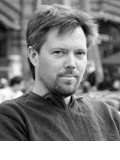|
|
|
<<< Previous speaker
|
next speaker >>>
|
Michael Ashley

Michael Ashley is currently Development Director for Cultural Heritage Imaging, a California not-for-profit working on state-of-the-art imaging and semantic management tools for digital conservation. He received his Ph.D. at the UC Berkeley, where he continued to work as staff in the Office of the Chief Information Officer and Data Services.
He co-founded several initiatives, including the award winning Open Knowledge and the Public Interest (okapi.berkeley.edu), and the Media Vault Program, which seeks to develop digital preservation frameworks for research and scholarship. Dr. Ashley has more than 16 years of experience in cultural heritage informatics management and education.
He is Chair of the IT and Communications Task Force for the World Archaeological Congress and on the Society for Historical Archaeology Website Advisory, and is specifically interested in developing international standards for the preservation of cultural and digital heritage.
An archaeologist by training, he was the Media Team specialist for the Çatalhöyük Research Project for more than 7 years and has worked on several heritage preservation projects worldwide. Email: archaeology@mac.com
|
Presentation: "Open Standards Development: Opportunity or Constraint?"
Time:
Wednesday 14:15 - 15:15
Location:
Concordia
Abstract: Is the open standards movement as significant a development as open source?
Does it translate in opportunities for you, or is standards work a barrier to free
software development? Are standards-development bodies the right places to
engage in software development? Should you get involved, or are standards
forums a waste of time, slow and bureaucratic, and a distraction from open source
development opportunities?
The participants on this panel will share with you their diverse practical experience with open standards and open source development, and they will welcome an animated exchange of opinions. Bring your questions and comments, engage with the experts, and judge for yourself how open standards can help to move technology forward.
Presentation: "Standards Best Practices in Digital Preservation & Web Accessibility Standards"
Time:
Wednesday 17:15 - 18:15
Location:
Concordia
Abstract: Standards in the Real World
What are standards and why are they important? How are they created? How do standards affect you, not just as a software developer but also as a citizen? How can you participate in their development?
This track will address these and related questions through a panel discussion and four short presentations touching on many aspects of the standards-development process. From human to computer languages, currency and measurement to food and drink, laws and statutes to voting and elections, website design and equality of access to archeology, digital imaging, and file formats, standards touch our lives every day.
These sessions will inform and engage you, and will present standards in a new light
Standards Best Practices in Digital Preservation
This talk will take a holistic approach to comprehensive work flows that integrate best practices of standards in digital preservation, with the diverse standards of practice for documenting cultural heritage sites worldwide, emphasizing the following domains:
- Data acquisition and recording techniques for Cultural Heritage
- Documentation and Spatial Information Management
- Standards and documentation for Cultural Heritage
- Internet-based Cultural Heritage applications
- e-Libraries and e-Learning in Cultural Heritage
- Reports, activities and Integration of related disciplines and techniques
What standards of practice mind both sides of the cultural/digital gap? Where are the decision-points in
preservation workflows and what are the alternatives? What technological solutions are of lowest risk
and highest impact for heritage documentation? The paper points to real-world standards in practice
that are effective and are ether in practice or under development.
While best practices and standards are useful when followed, the majority of legacy information for
cultural heritage is squirreled away in hard drives, outdated software applications and outmoded methodologies.
We raise this issue for discussion and offer an action plan for collecting a comprehensive list of risk areas and
solutions for the digital deluge that is already upon us. We will outline mitigation, migration, archiving and repository
strategies, and push for contributions from all participants.
Documenting the decision-steps in digital informatics - from photography, lab work, scanning, modeling, etc - are
essential to building context, evaluating reliability and accuracy, as well as providing transparency and scientific
replicability. Meta-documentation is rarely done to a sufficient level, for it is time consuming and the perceived,
present value is minimal. The CIDOC-CRM, an ISO standard, now includes options for 'empirical provenance,'
where the entire process history of any event can be recorded and evaluated. We will demonstrate the phenomenal
value of this approach to digital documentation.
Web Accessibility Standards
The web has enormous potential to empower people with disabilities.
However, authors and tool developers may inadvertently erect barriers
in their designs that make it difficult or impossible for people with
disabilities to use their web sites. The W3C's Web Accessibility
Initiative (WAI) has developed standards for authors, user agent
developers, and authoring tool developers to make clear what kinds of
functionality are needed to ensure access to the web for everyone.
|
 |
| |




